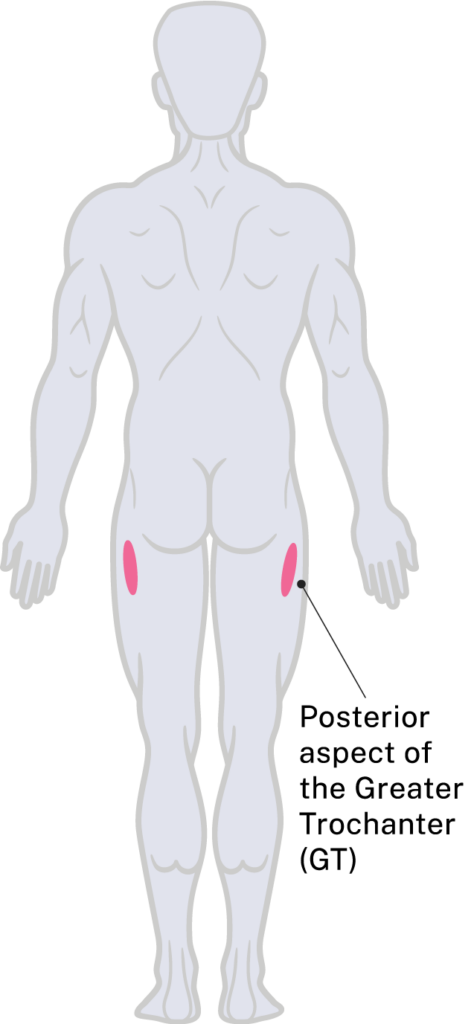Posterior Aspect of the Greater Trochanter
Specific risks
This area is at risk in sitting, especially on surfaces that increase loading to the posterior greater trochanters. These surfaces may include wheelchair cushions, toilet seats, car seats and shower commodes.
Skin breakdown may also occur when side-lying with increased risk caused by:
- wasting of the lower limbs
- impaired sensation
- impaired mobility
- a poor-quality mattress
- bottoming out between air cells on the mattress
- lying on incontinence sheets or pads
- moisture from sweating or incontinence
Postural changes such as pelvic obliquity can increase risk on one side.
Poor transfer technique:
- an ill-fitting, wet or textured sling can cause pressure, shear and friction
- side-ways ‘drag’ during horizontal transfers can cause shear and friction
- These areas should be assessed by palpating for ‘boggy’, soft, or tender areas.

Management of breakdown
- Sitting is not recommended with a wound on the posterior aspect of the greater trochanter. The best offloading technique is bed rest in supine with legs flexed, prone lying or side-lying on the opposite side of the wound.
- Depending on pain and comfort levels, offloading may be achieved in a quarter-turn position away from the side with the wound.
- All toileting tasks are undertaken on the bed. Consider temporary use of an indwelling catheter instead of intermittent catheters, to avoid sitting up in bed as catheterisation when in a side lying position can be difficult to master. A shower trolley may be an option if suitable for the environment. Transferring onto the trolley will need to be reviewed to avoid contact with the wound during transfers and showering.
- Review and identify causative factors such as the mattress, cushion, showering aids, other seated surfaces, transfers, clothing, muscle bulk, care routines and continence management.
- Assess transfer technique when able.
- Review the posture. An on-bed assessment can be performed whilst on bed rest.
- Stage 3 or 4 pressure injuries may require a surgical consult.
For urgent consultation
On-call Consultant Spinal Injuries Unit,
Princess Alexandra Hospital Ipswich Road,
Woolloongabba, Queensland.
Switch: (07) 3176 2111
Ask for the SIU Registrar on business days or an on-call SIU Consultant during after-hours for the Spinal Injuries Unit.
For a review at the Spinal Injuries Unit outpatient department
Referrals can be faxed through the central intake hub on 1300 364 248.
To link with community services
Contact Spinal Outreach Team at 3176 9507 or spot@health.qld.gov.au
Check out other pressure injury locations and learn how to manage them.